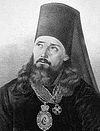

| Previous day | Next day |
| Old Style
September 23
|
Thursday |
New Style
October 6
|
| 16th Week after Pentecost. Tone 6. | Fast-free period.
|
![]() The Conception of the Glorious Prophet, Forerunner, and Baptist John.
The Conception of the Glorious Prophet, Forerunner, and Baptist John. ![]() Glorification of St. Innocent, metropolitan of Moscow, enlightener of Alaska and Siberia (1977).
Glorification of St. Innocent, metropolitan of Moscow, enlightener of Alaska and Siberia (1977).
Sts. Xanthippa and Polyxena, of Spain, disciples of the Apostles (109). Virgin-martyr Irais (Rhais) of Alexandria (308). Martyrs Andrew and John, and his sons Peter and Antoninus, of Syracuse, martyred in Africa (9th c.).
St. Adomnan (Adamnan), abbot, of Iona (704). New Martyr Nicholas the Grocer, at Constantinople (1672). New Martyr John of Epirus (1814).
Repose of Abbess Eupraxia of Old Ladoga Convent (1823) and Hieroschemamonk Jerome of Solovki (1847).
Thoughts for Each Day of the Year
According to the Daily Church Readings from the Word of God
By St. Theophan the Recluse

Thursday. [Eph. 1:1-9; Mark 7:24-30]
What moved the Syrophenician woman to come to the Lord and be so persistent in her petition? The shape of her convictions which had formed—she was convinced that the Saviour had power to heal her daughter and she came to Him; she was convinced that He would not leave her petition without fulfilment, and she would not stop asking. Convictions are the sum total of all of life, upbringing, current thinking, impressions from surroundings, from teachings received and various incidents and activities in life. One’s thoughts work under the influence of all this, and come to certain convictions. Meanwhile one must keep in mind that God’s truth is everywhere, and from everywhere crowds into the soul of man. Truth lies in the heart of man; God’s truth is imprinted in all creatures. There is God’s truth in the customs and dispositions of man; it is also in his teachings to a greater or lesser degree. But falsehood is everywhere as well. He who is of the truth gathers the truth, and is full of true, saving convictions. Whereas he who is not of the truth gathers lies and is full of false convictions, and fatal delusions. Whether a person is of the truth or not of the truth—let everyone examine for himself; but meanwhile God’s judgment awaits everyone.…
Articles
 Icon of St. Innocent of Moscow weeping myrrh In KhabarovskThe unusual phenomenon was noticed by the seminary aspirants who came to take entrance examinations. |









